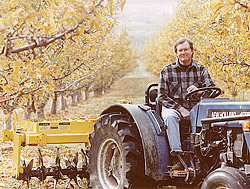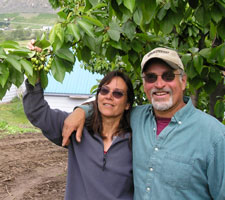Why local matters — Washington apples and pears
by Debra Daniels-Zeller
This article was originally published in September 2005

(September 2005) — Fall, apples and pears naturally flow together. Summer harvest is over and rainy winter days loom on the horizon. This time of year, baking with autumn fruit refreshes my seasonal passion. The fragrance of baking apples mingling with cinnamon brings back memories of my grandmother’s delectable homemade apple pie. Locally grown apples were always the essential ingredient.
Today, Washington provides an abundant selection of crisp apples and juicy pears. But the tree fruit industry also is vital to the state’s bottom line, reminding us of why it’s important to buy local.
The State Horticultural Society reports that Washington tree fruit is first in the state for overall economic value. More than 142,000 jobs are generated, from field work to advertising and sales. The total cumulative value is greater than that from Microsoft and Boeing combined. It’s also greater than the value of the biotechnology industry, which reportedly employs 19,300 statewide and generates only $1.8 billion in revenue.
The economic value of Washington tree fruit is more than $2 billion a year from the Yakima Valley alone. Half the apples grown in the United States and approximately 64 percent of our nation’s pear supply comes from Washington.
PCC offers select local organic apples and pears grown by our farming neighbors east of the Cascades — Scott and Lupe Leach in Zillah, and George and Apple Otte in Tonasket. It’s gratifying to know the money we spend on food sustains local organic farmers and our local economy.
Scott Leach, a fourth-generation farmer, tends 60 acres of picturesque apple and pear orchards just south of Yakima. His great-grandparents had an orchard early in the 20th century about 30 miles away from where his orchard is located today.
Scott always wanted to farm. He grew up working in his father’s orchard, eventually got his own piece of land and planted his first orchard in 1980. He works side by side with his farm workers and says they are “part of the fabric of the community. Nobody up here uses contractors (for labor),” he says.

George Otte and his wife, Apple, bought their orchards in 1997. They immediately began transitioning to organic growing methods. George had worked in orchards for many years and knew the work was physically challenging. Like Scott, the Ottes pay their workers as much or more than most orchardists.
“If you treat people fairly, they’re going to do a good job. Many of our workers return year after year,” Apple said. In the early years, the market for their apple harvest wasn’t favorable, but the Otte’s established a connection with PCC. “We are gratified by the support PCC gives small farmers to help them succeed,” says Apple.
Dedicated local orchardists like Scott Leach and the Ottes face many challenges. Apples and pears spend a longer time on the trees than other fruit and are vulnerable to the whims of nature for an extended period of time. Threats from diseases and insects can be unrelenting.
“Continual monitoring is the key,” says Apple Otte. Weather can be a wild card. Blossoms on the trees might be at the mercy of an early freeze, or immature fruit can be subjected to sudden hailstorms like the one Scott Leach experienced a few years ago. The hail pummeled his orchard and significantly reduced his crops for the next few years. But Scott persevered.
“Energy costs, lack of water, the weather — it’s the nature of the beast,” says Scott. One year, the Ottes had “winds so ferocious that apples and pears were blown right off the trees,” Apple says. “Farming is a gamble,” she adds.
The influx of foreign produce and cheap prices also affects local farmers. Nearly half of the apples produced in the world are grown in China where laborers earn less than a dollar an hour. The projected Chinese crop for 2005 is 88 billion apples. In Washington, 10 to 12 billion apples are harvested annually. While China hasn’t impacted our fresh fruit crops yet, our frozen juice concentrate industry has been devastated by cheap, reduced-quality fruit imports from Argentina, Brazil and China. Next time you purchase frozen juice, check the bottom of the can to see where the fruit is from.
What does it cost our communities when we choose imports at the expense of our local farming neighbors such as Scott Leach and the Ottes? Our landscapes and communities are determined by the choices we make. PCC has long placed a high value on establishing connections and forming important bonds with local farmers.
“Our favorite reward,” says Apple Otte, “is passing out samples in the stores and hearing all the wonderful comments about our fruit. Growing organically isn’t for everybody. To do it well, you have to believe in it. (Sustainable farming) takes a lot of time and commitment.”
Farming isn’t an easy route, says Scott. “It can be challenging to continue.” I remember this when I bite into a crisp, Washington-grown apple or a juicy pear. I’m thankful for the fragrant orchards that support our sustainable farming neighbors and make our state a better place to live.
